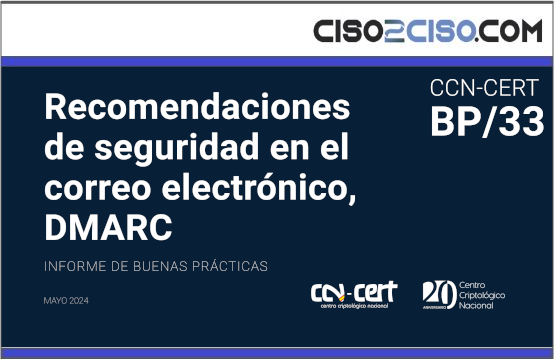The document titled “Recommendations for Email Security, DMARC” (CCN-CERT BP/33) was published by the National Cryptological Center (Centro Criptológico Nacional) in May 2024. It serves as a comprehensive guide aimed at enhancing cybersecurity practices related to email communication, particularly through the implementation of DMARC (Domain-based Message Authentication, Reporting & Conformance).
Overview
The document emphasizes the critical role of information and communication technologies (ICT) in today’s interconnected world and the collective challenge of managing cybersecurity effectively. It highlights the necessity of protecting the economic, technological, and political capacities of the country, especially in light of the increasing prevalence of targeted attacks and the theft of sensitive information.
Key Sections
- Introduction and Purpose: The introduction outlines the importance of establishing a framework for cybersecurity that supports public administration personnel in safeguarding their ICT systems. The document aims to provide clear guidelines and procedures to improve the cybersecurity posture of organizations.
- DMARC Implementation: A significant portion of the document is dedicated to the implementation of DMARC, SPF (Sender Policy Framework), and DKIM (DomainKeys Identified Mail). It discusses the importance of monitoring alignment data and performance metrics to make informed decisions about advancing email security policies. The document stresses the need for continuous monitoring of failure reports and aggregated reports to identify failure patterns, common error types, and problematic sending sources.
- Data and Metrics Identification: The document outlines essential data and metrics that should be evaluated to assess the effectiveness of DMARC implementation. It suggests that organizations analyze alignment data and performance to make informed adjustments to their email security policies.
- Recommendations for Policy Advancement: It provides guidance on how to safely progress towards more restrictive DMARC policies, which can enhance email security and protect against fraud and identity theft. The recommendations include maintaining constant monitoring of DMARC, SPF, and DKIM alignment data.
- Legal Notice and Copyright: The document includes a legal disclaimer regarding the limitations of liability and the prohibition of reproduction without written authorization from the National Cryptological Center. This section underscores the importance of adhering to legal guidelines when utilizing the document’s content.
Views: 0




















































